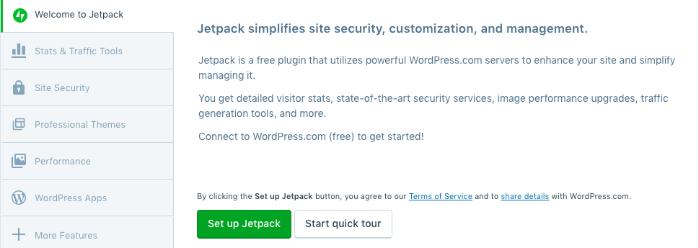How Jetpack Can Simplify Your WordPress Plugin Workflow
No WordPress website is complete without plugins. With the right ones, you can add any features you want to your site. The problem is that the more features you want, the more plugins you need. That is, unless you can find a single plugin that can lift far beyond its weight.
A lot of WordPress installations ship with bundled-in plugins. Out of those, Jetpack is perhaps the most popular, and it’s easy to see why when you look at its feature list. With Jetpack, you get access to built-in image optimization, easy backups, security functionality, and a lot more.
In this article, we’ll talk about all the features Jetpack has to offer. Then we’ll show you how you can get a free license for the plugin if you sign up for a managed WordPress hosting plan. Let’s jet off!
An Introduction to the Jetpack Plugin

The idea behind Jetpack is to give new self-hosted WordPress users all the tools they need to run their websites more efficiently. If you’ve ever used WordPress.com before, you’ll recognize a lot of the features Jetpack offers.
Using Jetpack means you get access to most of the cool functionality that WordPress.com provides for its premium users. That includes automatic social sharing, related content sections, analytics, and more.
At the same time, you get to enjoy the full freedom of having a self-hosted WordPress installation. To use Jetpack on self-hosted WordPress websites, you will need a WordPress.com account, but you still get to use the open-source version of the CMS.
Like WordPress itself, Jetpack comes in two flavors. The version that most web hosts include with new WordPress installations is the free one. Some web hosts, however, offer free Jetpack premium licenses, depending on which plan you sign up for.
In a bit, we’ll look at how to get one of those licenses. Whatever version of Jetpack you use, however, you’ll get access to a lot of handy features.
5 Benefits of Using the Jetpack Plugin
Most of the functionality we’ll cover in this section is available in both Jetpack’s free and premium versions. For any features that aren’t available with the free plugin, though, we’ll give you a heads-up. With that out of the way, here are five things you can do with Jetpack!
1. Monitor Your Website’s Downtime
Websites don’t have opening hours. You want your site to be accessible 24/7 and year-round. Sometimes things go wrong, however, which can cause your website to go down.
For example, your server might malfunction, or an update might break your site. If something like this should happen, you’ll want to know right away, so you can jump in and fix the problem before too many people notice.
With Jetpack premium, you get a built-in downtime monitoring service:

If at any point Jetpack detects that your website isn’t accessible, you can jump in and contact your web host, or see if you can fix the issue yourself.
2. Protect Your Site from Spam and Malware
There are a lot of ways in which your website can be vulnerable to attacks. For example, attackers can flood your site with bots, which can slow down your server, cause downtime, and cost you a lot of money.
Likewise, your WordPress comment sections are also prime targets for spam comments, links to low-quality websites, and even malware sharing. Jetpack protects you from all of those threats in several ways, including:
- Blocking known malicious IPs from your site
- Protecting you from unwanted login attempts
At any point, you can check out how many attacks Jetpack has blocked right from your dashboard:

These security features are also available with the free version of Jetpack, so that everyone gets to enjoy them.
3. Improve Your Website’s Performance
Some websites are faster than others, and it’s not always easy to determine why. When it comes to performance, two of the biggest culprits for slow websites are:
- Un-optimized image files
- Too many scripts or files loading in the background
What Jetpack does is take a big part of that load off your servers. The plugin integrates its own Content Delivery Network (CDN) service with your website, which hosts and optimizes images for you so that users can load them faster.
As far as scripts go, Jetpack also takes over by serving all your JavaScript from its own data centers. The result is that your website should load faster across the board, and hold up better under traffic surges.
4. Get Access to Analytics
If you want to grow your website, you need access to information about how much traffic you receive, which posts perform better, where your visitors are coming from, and more. All that data falls under the umbrella of ‘analytics’.
There are a lot of powerful tools you can use to get access to analytics data, and Jetpack includes its own:

With Jetpack analytics, you can monitor multiple key data sets, including:
- What your top posts, searchers, and referrers are
- What your most popular content is
- When users visit your website and where they’re located
Most analytics tools require lengthy integration processes with WordPress. Jetpack, on the other hand, enables you to get access to analytics data with a one-click setup.
5. Generate Backups for Your Website
Backups are key to any website, both to protect its data and provide you with peace of mind. At all times, you should have a recent backup of your entire site, in case you run into any technical difficulties that you can’t easily fix.
There are a lot of ways you can back up your site’s data. You can do it manually, through your web hosting control panel (in most cases), and by using WordPress plugins. We can number Jetpack among those plugins, because it includes built-in backup functionality for its premium users.
Jetpack premium automatically creates daily backups for your website, and takes care of storing them. If you ever run into any issues, all you have to do is access your latest backup and use Jetpack to restore it.
How to Get a Free Jetpack Personal License
Here at A2 Hosting, all of our WordPress plans include Jetpack as part of every installation:

If you use one of our managed plans, you even get access to a free personal premium license, so you can enjoy all the features we’ve talked about so far. You can access and activate that license from your A2 Hosting customer portal by following these instructions.
Conclusion
WordPress has thousands of plugins to offer. With the right tool, you can add almost any functionality you want to your website. Some plugins, such as Jetpack, take things a step further, and enable you to add multiple features in one fell swoop.
If you use one of our managed WordPress plans, you’ll get access to a Jetpack personal license. That means you can easily:
- Monitor your site’s downtime.
- Protect your website from spam and malware.
- Improve your site’s performance.
- Get access to analytics.
- Generate backups for your website.
Image credit: Pixabay.



